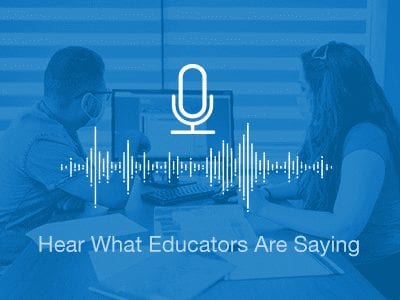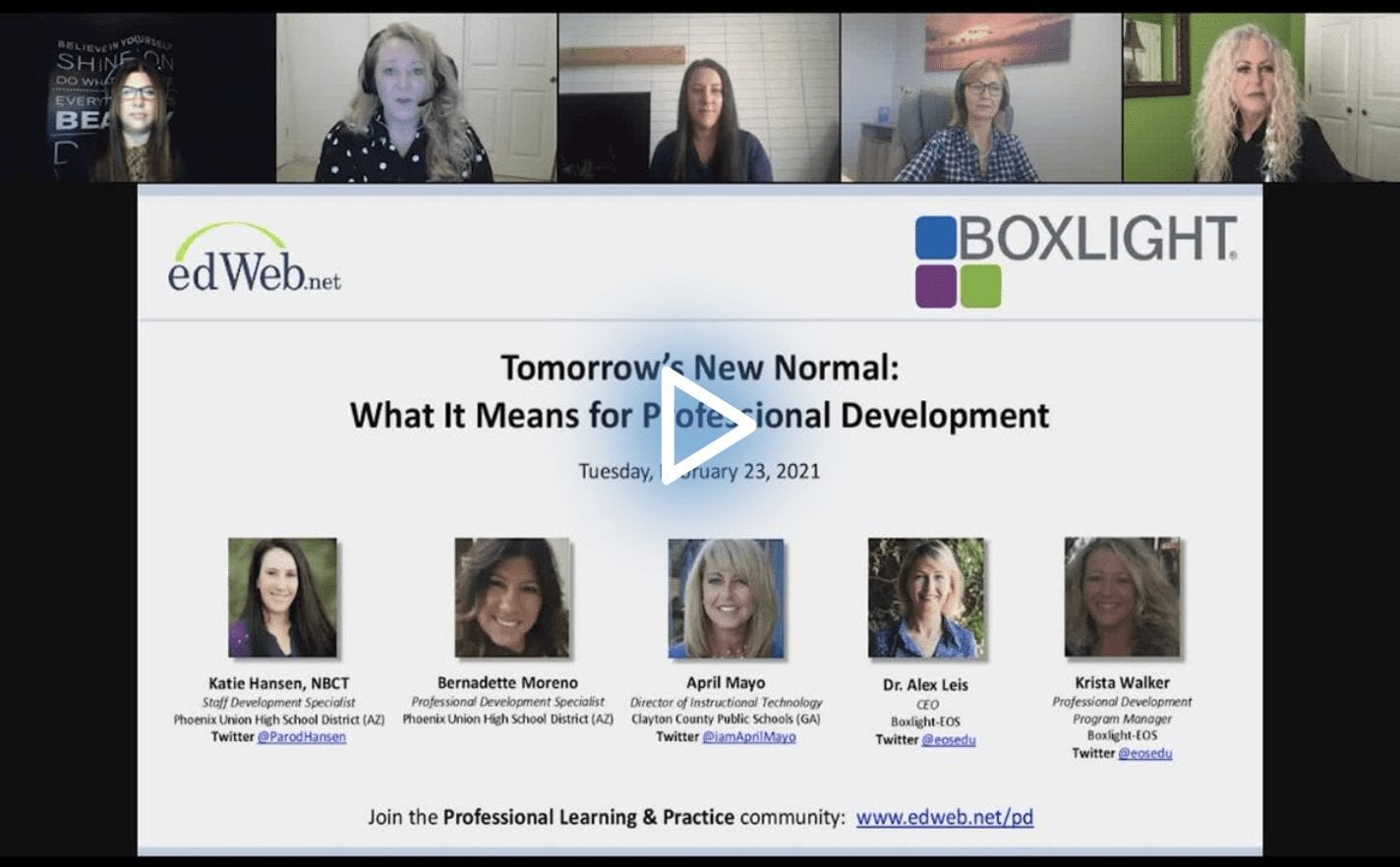Tomorrow’s New Normal: What It Means for Professional Development
By Eileen Belastock
WATCH THE EDLEADER PANEL RECORDING
Due to COVID-19, most of our educational systems reflect a new normal, with hybrid and remote learning, increased use of technology, and teacher professional development. In a recent edLeader Panel sponsored by Boxlight, Dr. Alex Leis, CEO, and Krista Walker, Professional Development Program Manager of Boxlight-EOS, discussed the challenges and successes of professional development with panelists from Clayton County Public Schools (GA) and Phoenix Union High School District (AZ).
Challenges
Both Clayton County Public Schools and Phoenix Union High School District had learning platforms such as Google and Microsoft for years before the pandemic. However, once schools closed, the professional development teams struggled with supporting the 25% of their teachers who were not at the skill level necessary to tackle and be successful in remote and hybrid learning environments.
Katie Hansen, Staff Development Specialist for Phoenix Union High School District, said her district was not in a 1:1 space, so it was essential to build capacity and understand the tools available to everybody and think about how they should drive those learning outcomes. “The positives were that we banded together as a system to try to fill in those gaps, whether it was training gaps, infrastructure, or device gaps.”
Both districts agreed the pandemic forced everyone to jump headfirst into edtech, whether or not the capacity was there. Bernadette Moreno, Professional Development Specialist for Phoenix Union High School District, said COVID-19 expedited the learning curve for her teachers. They knew their curriculum, but now they’re being taken out of their comfort zone to adapt to online platforms. “We needed to identify where our strengths were and build systems around where we fell short. The pandemic made it apparent how important it is for everyone to utilize the supported digital resources.”
Approach to PD
Both school districts began approaching professional development as opportunities to reimagine education as more flexible, connected, authentic, and appropriately challenging. In their districts, the panelists focused on the instructional goals and prioritized those to fit the teaching and learning models. They were also mindful of making sure professional development around the goals was relevant and job embedded. A critical step in redesigning professional development was connecting and partnering with support systems that allowed district professional development teams to sit back, observe, and create robust learning opportunities for their teachers.
Positive Outcomes
The panelists all agreed that while the pandemic impacted schools negatively, it also brought some positive changes. Teachers had accelerated the learning curves in digital fluency with a range of design and feedback tools. April Mayo, Director of Instructional Technology for Clayton County Public Schools, said a positive change is “teachers taking advantage of our support and training opportunities and other professional development courses that the district has made available.” Research shows highly qualified teachers make a difference in student achievement. Hence, her district focuses on student engagement, implementing the best practices from the traditional environment, and adapting them to both hybrid and remote learning environments.
Hansen said the new normal of professional development includes flexibility and open-mindedness to meet teachers where they are. All agreed it is essential to the success of any professional development program to have specialists like Moreno sitting at the table and being a part of instructional conversations to bridge both the district and the classroom needs. Lastly, the panelists said as they are redesigning professional development for tomorrow’s new normal, it is vital to optimize lessons learned and focus on future goals to ensure professional development is timely, flexible, and personalized.
This edWeb broadcast was sponsored by Boxlight.
WATCH THE EDLEADER PANEL RECORDING
About the Presenters
April Mayo is the director of instructional technology for Clayton County Public Schools. Located just south of Hartsfield-Jackson Airport, Clayton County Public Schools is the fifth-largest school district in the Metro Atlanta area. April has served 24 years in the K-12 environment. In addition to her seven years in instructional technology, she was a classroom teacher and media specialist. Working closely with teachers, media specialists, principals, and district leaders, April and her team strive to provide the highest-quality digital tools that maximize instructional time, increase student investment, and provide opportunities for immediate or timely feedback. In addition to providing the best solutions, the instructional technology team also provides comprehensive support to teachers.
Katie Hansen is a National Board Certified teacher and currently serves as the staff development specialist for Phoenix Union High School District, where she coordinates and designs ongoing professional learning for educators in her organization. Katie has 17 years of classroom and curriculum development and design experience at the secondary level and is a strong advocate for the advancement of the teaching profession. She is a contributor to state and local academic standards and teaching exemplars that help create high learning expectations and opportunities for all students. Katie currently resides in Phoenix, Arizona with her husband and three children and enjoys the outdoors in her free time.
Bernadette Moreno is a Phoenix Union High School District alumna from South Mountain High School. She has been teaching in the Phoenix Union High School District for more than 22 years. Her focus as the professional development specialist is to deliver tailored professional development to all staff while supporting campus-wide AVID strategies (WICOR). Bernadette strives to build a sense of community through fellowship and creating opportunities for collaboration.
Dr. Alex Leis is the founder and CEO of Boxlight-EOS Education, a leading provider of professional development services to educators and school administrators. The company specializes in large-scale PD implementation programs focused on teachers using technology to improve teaching and learning. Dr. Leis is an expert in the field and brings decades of both academic and business management experience in both Europe and the United States, including senior leadership positions at Ipsos, ImmediaEDU and now Boxlight.
Krista Walker is the professional development program manager for Boxlight-EOS Education, coordinating large-scale district PD programming. Krista is an educator with 25 years of experience. She is also a community and education advocate, program development manager, and curriculum author. Her other roles have included Adapted Recreation Coordinator, providing 21st century enrichment and academic programming for individuals with developmental disabilities; National Director of School Programs and Professional Development for Social and Emotional Learning in K-8 schools; Community Engagement Coordinator, and Consultant on grants and inclusive practices for state agencies and non-profits.
Join the Community
Professional Learning & Practice is a free professional learning community on edWeb.net that presents edWebinars and hosts online discussion forums on a wide range of issues on professional learning and educator practice.
Boxlight aims to help educators enhance instructional delivery and boost student learning with innovative solutions that range from interactive displays to complete STEM curriculum and exploration kits along with professional development services. Boxlight wants to ensure that educators have what they need to maintain learning continuity where everyone feels successful.
Eileen Belastock, CETL is the Director of Technology and Information for Nauset Public Schools, MA, and also works with edWeb.net to write articles on their professional learning edWebinars. You can follow Eileen on Twitter @EileenBelastock.





Comments are closed.